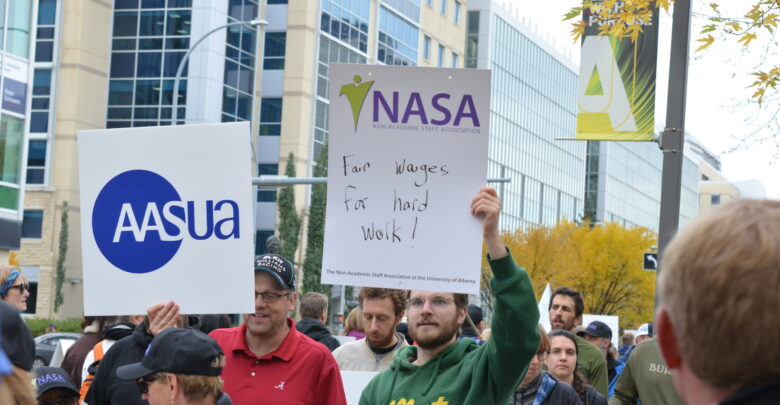AASUA and NASA rally in support of bargaining teams
AASUA's and NASA's bargaining teams are asking the university for reduced workloads, increased job security, benefits for precarious staff, and competitive compensation.
 Rachel Narvey
Rachel NarveyOn October 9, the Association of Academic Staff at the University of Alberta (AASUA) and the Non-Academic Staff Association (NASA) held a joint rally. The rally was in support of their bargaining teams, who are in negotiations with the university for improved working conditions and compensation for their members.
AASUA represents approximately 4,000 members including academic faculty, teaching staff, librarians, administrative professionals, and researchers. NASA is a union that represents more than 6,000 support staff at the U of A.
The rally was held from 12:00 p.m. to 1:00 p.m. in front of the Timms Centre for the Arts. It featured speeches from AASUA President Gordan Swaters and Vice-president Kristine Smitka. NASA’s political action chair Lisa Budney also spoke. After the speeches, organizers encouraged participants to march with their signs and chant to show support for their demands.
According to a joint media release, AASUA and NASA are negotiating with the university for reduced workloads, increased job security, benefits for precarious staff, and competitive compensation.
“It’s so important that we come together in a visible way,” Smitka says
Smitka emphasized the importance of showing support, saying that “it’s so important that we come together in a visible way. That the bargaining team and our employers understand that we represent the members. That it’s our members who really want to see change at the bargaining table in this round of bargaining.”
Her speech also focused on growing frustration among AASUA members surrounding the U of A’s use of contract workers. According to Smitka, contract workers teach 50 per cent of U of A undergraduate courses.
“Academic teaching staff, many of whom do not have access to dental, access to the right to parental leave, and many of whom are getting their courses assigned to them at the last minute,” Smitka said.
In his speech, Swaters said that the U of A is a top four school and staff should be treated like they work in one.
“The employer is putting the U of A at risk by prioritizing high paid upper management over the student experience,” he said.
Swaters emphasized the importance of protecting the U of A’s high quality education. He explained that bargaining serves to “ensure the future of Alberta belongs to young Albertans.”
“We’re not being greedy. We’re asking to catch up,” Budney says
Budney’s speech focused on non-academic staff who work in the U of A’s libraries, offices, and other facilities around campus. According to Budney, when the provincial government cut funding to the ministry of advanced education in 2020, over 1,000 NASA members lost their jobs.
Budney highlighted salary issues. She said that “some [members] are even using food banks” to get by. According to Budney, the cost-of-living crisis has hit members “particularly hard.”
NASA is negotiating for wage increases of 15 per cent, and 8 per cent over two years.
“These percentages are fair and will only bring our wages up to where they were ten years ago. We’re not being greedy. We’re asking to catch up.”
“We’re not asking students to pay for our Mercedes-Benzes. We’re asking that this university budget fairly,” Swaters says
After the speeches ended, Smitka and Swaters spoke with The Gateway.
Smitka addressed the demand for reducing the workload of academic staff. According to Smitka, AASUA is “asking for some reasonable things like a workload review committee. So that when somebody has had four people’s jobs dumped on top of them, there’s some mechanism to address that.”
She also said that one in three AASUA members occupy a type of contingent or contractual position. According to Smitka, this can range from a multi-year contract to one as short as two months. This leaves staff with the choice to keep re-applying for their job, or seek employment elsewhere.
Many professors receive their teaching assignments last minute, which Smitka said impacts the student experience.
“They can’t plan their course, they can’t order their textbooks, they’re rushing to set up their Canvas or Moodle. That’s not good for the student experience,” Smitka said.
According to Swaters, increasing wages and providing more permanent positions is not something AASUA expects students to finance.
“It’s a fair concern of students to wonder if our salary demands might result in a tuition increase over and above what the administration has planned. But I have been deliberately constructing the argument so we are not asking this institution for an unfair share of the operating budget.”
He said that the “university spends about three to five per cent less of its operating budget on academic salaries compared to the Alberta average.” AASUA’s request is to be on the same level as other institutions in Alberta, he said.
“We’re not asking students to pay for our Mercedes-Benzes. We’re asking that this university budget fairly.”




